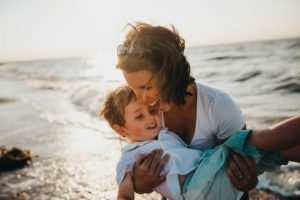Kindling new connections in the study of friendship, romance, and affection

As a scholar of love, University of North Carolina social psychologist Sara Algoe studies the links between emotions, relationships and health to understand what makes for high-quality romantic bonds. As she studies the nature of love, she’s also become something of a matchmaker in her field, working to connect sociologists, psychologists, and other scientists who study love. Algoe believes that it’s essential to share their approaches, insights, and data in order to help increase our understanding of what love is and how it works.
Currently, researchers working on love tend to approach their questions through one of two methodological lenses: relationship science focuses on the couple, while affective science focuses mainly on the emotional experiences of the individual. Algoe’s own early background was in the latter area. “My research has been coming to love because of the behaviors that I see in people and how they enact love toward other people,” she says. “But we haven’t really tapped into the rich methodology that comes from relationship science.” Similarly, “there’s all this work in relationships research studying people who are in romantic relationships, but it doesn’t necessarily draw on the really rich theory that comes from affective science.” Like a good romantic comedy scriptwriter, Algoe reached a simple realization: “it really seems like it is time to get the two groups to start talking to each other.”
A LOVE CONSORTIUM
Algoe’s plan to get the conversation going includes organizing side gatherings at major conferences and other meetings to build out the network of love researchers. She is also working to create an international research consortium whose board of directors includes Algoe’s UNC colleague Andrea Hussong, Shelly Gable of UC Santa Barbara, the University of Toronto’s Emily Impett, Nickola Overall from the University of Auckland, and Harry Reis of the University of Rochester. “They’re all amazing experts in the field, and are helping advise me on a lot of the practical and theoretical aspects of the project, as well as the best ways to bring people into the conversations,” Algoe says.
Gable and Reis, along with her colleague Barbara Fredrickson at UNC, are also helping Algoe organize a “love boot camp” for promising graduate students interested in the topic. “We’re going to get people thinking about what love really is from multiple perspectives,” Algoe says, covering insights and methods from both the relationship- and affective-science approaches, and providing training on integrative data analysis. Alumni of the boot camp will be encouraged to submit proposals for small grants designed to kickstart research at the graduate student level.
SETTING AN EXAMPLE
Algoe is working to carry out her research in light of the new connections and conversations she has helped to foster. She is in the beginning phases of a long-term study charting the ways that students experience various kinds of love during their college years. Algoe is particularly interested in the ways that people’s self-conception does or doesn’t influence the ways their friendships develop. “If you’re the kind of person who says that you’re a loving person,” Algoe asks, “how does that come through in your interactions with these people? When you meet people do you have higher quality interactions? If the friendship doesn’t last, do you still have respect for that person?” In accordance with open science principles, Algoe’s team will be pre-registering their hypotheses and sharing the data they are able to gather, which will range from self-reported accounts of frequency-of-communication to academic performance and physiological markers like heart rate variability or hormone levels. The goal is to assemble a rich suite of data to understand the experience of love and its effects on our lives, both at a given moment and over the long term.
OPENING UP
For the science of love to flourish, Algoe believes that it isn’t enough to build relationships and share ideas and methodologies — you have to share data as well. “There are tons of existing data sets, and we now have the technology to start sharing information about those data sets in really systematic ways, opening up the doors for people to tap into the data and start collaborations in the service of understanding love better,” Algoe says.
Conclusions derived from too-small data sets and a lack of resources to repeat key findings have been key factors in the so-called “replicability crisis” that has shaken the social sciences in recent years. From her own work collecting data from both members of ongoing relationships, Algoe also knows that such resource-intensive studies will often gather additional data that never makes its way into a publication — ranging from survey answers to samples of saliva or urine that can be tested for hormone levels. “People like me often have stored samples in our freezers that could be used to test out new hypotheses,” Algoe says.
“Now we have this amazing opportunity to bring fresh eyes, fresh theoretical perspectives, and fresh methodological perspectives to the same data sets,” Algoe says. In her view, good scientific work should oscillate between phases of exploration and discovery, followed by careful confirmation. By making data widely available, it becomes possible for researchers to do significant explorations of already-existing information before committing to their own lengthy studies, Algoe says. “It’s a beautiful way to put forth really rigorous science — and feel more confident in in our findings.”
STILL CURIOUS?
Learn more about Sara Algoe’s research.